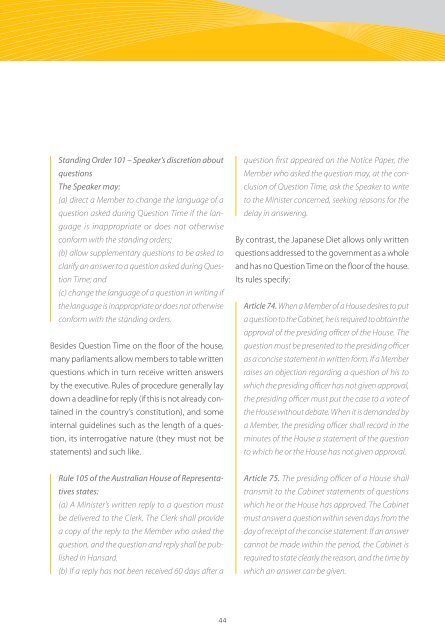Parliamentary Rules of Procedure - European Parliament - Europa
Parliamentary Rules of Procedure - European Parliament - Europa
Parliamentary Rules of Procedure - European Parliament - Europa
Create successful ePaper yourself
Turn your PDF publications into a flip-book with our unique Google optimized e-Paper software.
Standing Order 101 – Speaker’s discretion about<br />
questions<br />
The Speaker may:<br />
(a) direct a Member to change the language <strong>of</strong> a<br />
question asked during Question Time if the language<br />
is inappropriate or does not otherwise<br />
conform with the standing orders;<br />
(b) allow supplementary questions to be asked to<br />
clarify an answer to a question asked during Question<br />
Time; and<br />
(c) change the language <strong>of</strong> a question in writing if<br />
the language is inappropriate or does not otherwise<br />
conform with the standing orders.<br />
Besides Question Time on the floor <strong>of</strong> the house,<br />
many parliaments allow members to table written<br />
questions which in turn receive written answers<br />
by the executive. <strong>Rules</strong> <strong>of</strong> procedure generally lay<br />
down a deadline for reply (if this is not already contained<br />
in the country’s constitution), and some<br />
internal guidelines such as the length <strong>of</strong> a question,<br />
its interrogative nature (they must not be<br />
statements) and such like.<br />
Rule 105 <strong>of</strong> the Australian House <strong>of</strong> Representatives<br />
states:<br />
(a) A Minister’s written reply to a question must<br />
be delivered to the Clerk. The Clerk shall provide<br />
a copy <strong>of</strong> the reply to the Member who asked the<br />
question, and the question and reply shall be published<br />
in Hansard.<br />
(b) If a reply has not been received 60 days after a<br />
44<br />
question first appeared on the Notice Paper, the<br />
Member who asked the question may, at the conclusion<br />
<strong>of</strong> Question Time, ask the Speaker to write<br />
to the Minister concerned, seeking reasons for the<br />
delay in answering.<br />
By contrast, the Japanese Diet allows only written<br />
questions addressed to the government as a whole<br />
and has no Question Time on the floor <strong>of</strong> the house.<br />
its rules specify:<br />
Article 74. When a Member <strong>of</strong> a House desires to put<br />
a question to the Cabinet, he is required to obtain the<br />
approval <strong>of</strong> the presiding <strong>of</strong>ficer <strong>of</strong> the House. The<br />
question must be presented to the presiding <strong>of</strong>ficer<br />
as a concise statement in written form. If a Member<br />
raises an objection regarding a question <strong>of</strong> his to<br />
which the presiding <strong>of</strong>ficer has not given approval,<br />
the presiding <strong>of</strong>ficer must put the case to a vote <strong>of</strong><br />
the House without debate. When it is demanded by<br />
a Member, the presiding <strong>of</strong>ficer shall record in the<br />
minutes <strong>of</strong> the House a statement <strong>of</strong> the question<br />
to which he or the House has not given approval.<br />
Article 75. The presiding <strong>of</strong>ficer <strong>of</strong> a House shall<br />
transmit to the Cabinet statements <strong>of</strong> questions<br />
which he or the House has approved. The Cabinet<br />
must answer a question within seven days from the<br />
day <strong>of</strong> receipt <strong>of</strong> the concise statement. If an answer<br />
cannot be made within the period, the Cabinet is<br />
required to state clearly the reason, and the time by<br />
which an answer can be given.

















